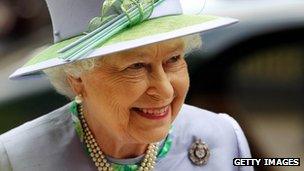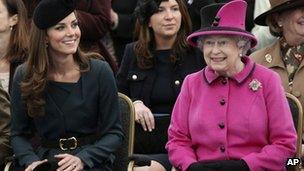Diamond Jubilee: UK will pay tribute to committed Queen
- Published

People in the UK have embraced the Diamond Jubilee, more so than in past years
More than ever, this Jubilee weekend will be a tribute.
Queen Elizabeth II has been the UK's head of state for longer than most of its citizens can remember.
For 60 years she has fulfilled the role of constitutional monarch, a figure separate from politics but always in touch with events.
The person who has embodied Britain to the wider world and been a focus for unity within the country's increasingly diverse communities.
For all of those reasons and others - not least her unflagging commitment to her role - there is perhaps a greater sense of personal regard for her than at any time since the early years of her reign back in the 1950s.
Crowds came out
Twenty-five years into her reign in 1977, Britain celebrated her Silver Jubilee - 25 years after that, in 2002, came the Golden Jubilee.
Both those jubilees started sluggishly. The 1970s was a decade of economic austerity and social transition.
The Queen had lost the glamour of her youth and Britain had lost its sense of deference to the monarchy.
Voices were raised against the cost of the Silver Jubilee. There were concerns in the then Labour government of James Callaghan that it might be something of a damp squib.
It was not.
When the day of the main Jubilee celebrations arrived, the Queen came out in shocking pink and the crowds in their hundreds of thousands.
By 2002 at the time of the Golden Jubilee, the Queen had recently emerged from her most difficult time, the 1990s.
The decade brought family divisions, the death of a much-loved princess and an unprecedented degree of criticism that the monarchy was out-of-touch with public sentiment.
Courtiers at Buckingham Palace were concerned over how Britain felt about its monarchy after the recent passage of such troubled times.
They need not have worried. After another slow start - when sections of the media fretted that the Jubilee was failing to take off - the crowds again proved the doubters wrong.
Warm reception
And so to 2012, and for this Jubilee the doubters seem to have been almost completely absent.
From the first Diamond Jubilee visit in early March to the multi-cultural city of Leicester, there has been a heightened degree of interest and real warmth in the receptions the Queen has received.

The Queen and the Duchess of Cambridge are all smiles on a visit to De Mont fort University in Leicester, at the start of the Jubilee tour
True, in Leicester she brought the Duchess of Cambridge with her.
A shrewd move which linked the Queen very publicly with her grand-daughter-in-law, but notwithstanding the interest in Kate, it was the Queen whom most people seemed keenest to see.
And so it will be this Jubilee weekend. She is 86 now and has been monarch for 60 years.
She conveys a sense of history the like of which we have not seen in Britain since the reign of her great-great-grandmother Victoria, the only other British sovereign to have celebrated a Diamond Jubilee.
We know that not everyone is a monarchist. Not everyone will - literally or metaphorically - be raising a glass this weekend.
But all the evidence suggests that Britain remains a nation which is overwhelmingly comfortable with the monarchy, and which feels that the qualities offered by a queen such as Elizabeth II are qualities which it values and would not wish to lose.
For those reasons, on the River Thames on Sunday, outside Buckingham Palace on Monday; at St Paul's Cathedral and along the route back to the Palace on Tuesday, and at countless street parties and beacon lightings, Britain will reaffirm its commitment and gratitude to its Queen.